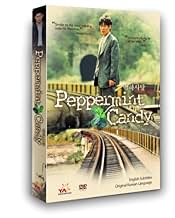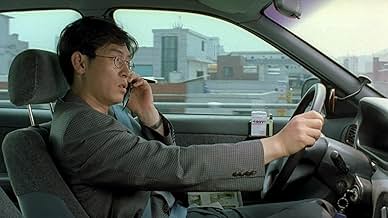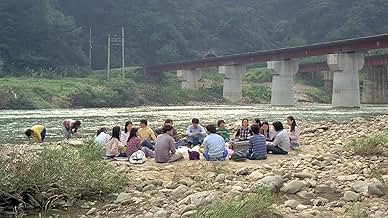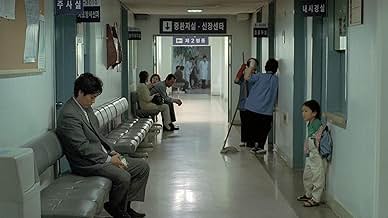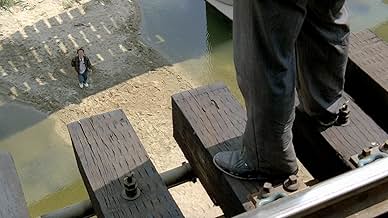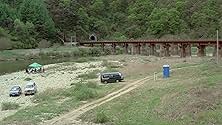CALIFICACIÓN DE IMDb
7.6/10
12 k
TU CALIFICACIÓN
Consiste en cinco fases de la vida de un hombre sobre los motivos que le condujeron al suicidio.Consiste en cinco fases de la vida de un hombre sobre los motivos que le condujeron al suicidio.Consiste en cinco fases de la vida de un hombre sobre los motivos que le condujeron al suicidio.
- Dirección
- Guionista
- Elenco
- Premios
- 18 premios ganados y 6 nominaciones en total
Ko Seo-hie
- Kyung-ah
- (as Seo-hie Ko)
Park Ji-yeon
- Female student
- (as Ji-Yeon Park)
Kim Kyeong-ik
- Myung-sik
- (as Kim Gyeong-ik)
Jeong Woo-hyeok
- Corporal Park
- (as Woo-hyeok Jeong)
Bae Jang-soo
- Camera shop owner
- (as Jang-soo Bae)
- Dirección
- Guionista
- Todo el elenco y el equipo
- Producción, taquilla y más en IMDbPro
Opiniones destacadas
Lee Chang-dong's second feature film is a lot more ambitious than his debut Green Fish. It presents a story unfolding in reverse chronology spanning several years before a man's suicide. The narrative is split between different parts with time gaps in between, connected by the movement of a train going back in time.
This film has some really great moments in it, but as a collective piece, it doesn't work as well as I wanted it to. I keep coming back to it hoping I find some new meaning to it, but my original opinion still hasn't changed. So let me go through everything that I didn't like about this movie, and then I'll move onto what I did like about it.
First off, I find the intro really annoying. It mostly has to do with the main character's obnoxious acting, but the silly characters surrounding him don't help much either. I don't claim to know anything about suicide, but I personally found it to be way over the top, especially coming from a director like Lee Chang-dong, who usually directs his films with incredible nuance and subtlety.
Throughout the whole movie I was asking "what is wrong with this guy" and clearly director Lee wanted me to be asking that so that the reveal at the end resonates with me emotionally. Unfortunately it didn't. I still sit there confused during rewatches, watching a lot of these scenes. It seems a little reductive to have a person's life be explained/justified by a single moment.
And my final big complaint is that there are no well written characters surrounding the protagonist. The big time skips between the segments make certain characters seem unrecognisable, and as a result they feel shallow, only used as narrative tools to hit certain plot points or references necessary for the main character's development.
On the bright side however, I really enjoyed certain parts of the story. Especially "Life is Beautiful" I thought was really well done, and managed to capture the complex emotions that Young-ho was feeling perfectly. The scene in the car driving back home is probably my favourite moment in the whole film. It says so much while doing so little.
Also I thought the callbacks were pretty well done throughout the film. That way the film maintains a through line that keeps the parts connected, and prevents the story from feeling too disjointed. The execution of the references isn't always the best, but it's at least serviceable, and it makes you remember important moments in the film.
In general I'm very conflicted about this film. I wanted to like it a lot more than I did, because there are some really interesting moments in this story. But in the end, it didn't impact me as much as Lee's other films did. But it's still a good movie, and I still enjoyed it, despite all of my problems with it.
This film has some really great moments in it, but as a collective piece, it doesn't work as well as I wanted it to. I keep coming back to it hoping I find some new meaning to it, but my original opinion still hasn't changed. So let me go through everything that I didn't like about this movie, and then I'll move onto what I did like about it.
First off, I find the intro really annoying. It mostly has to do with the main character's obnoxious acting, but the silly characters surrounding him don't help much either. I don't claim to know anything about suicide, but I personally found it to be way over the top, especially coming from a director like Lee Chang-dong, who usually directs his films with incredible nuance and subtlety.
Throughout the whole movie I was asking "what is wrong with this guy" and clearly director Lee wanted me to be asking that so that the reveal at the end resonates with me emotionally. Unfortunately it didn't. I still sit there confused during rewatches, watching a lot of these scenes. It seems a little reductive to have a person's life be explained/justified by a single moment.
And my final big complaint is that there are no well written characters surrounding the protagonist. The big time skips between the segments make certain characters seem unrecognisable, and as a result they feel shallow, only used as narrative tools to hit certain plot points or references necessary for the main character's development.
On the bright side however, I really enjoyed certain parts of the story. Especially "Life is Beautiful" I thought was really well done, and managed to capture the complex emotions that Young-ho was feeling perfectly. The scene in the car driving back home is probably my favourite moment in the whole film. It says so much while doing so little.
Also I thought the callbacks were pretty well done throughout the film. That way the film maintains a through line that keeps the parts connected, and prevents the story from feeling too disjointed. The execution of the references isn't always the best, but it's at least serviceable, and it makes you remember important moments in the film.
In general I'm very conflicted about this film. I wanted to like it a lot more than I did, because there are some really interesting moments in this story. But in the end, it didn't impact me as much as Lee's other films did. But it's still a good movie, and I still enjoyed it, despite all of my problems with it.
while it may take being Korean (and being part of the "386-generation" that really went through all the turbulent events of this movie's timeline) to fully appreciate this movie, it is nevertheless a powerful, graphic, and grippingly emotional commentary on South Korea of the the last twenty years. Director Chang-dong Lee masterfully presents the plot in reverse chronological order, and protagonist Kyung-gu Sol handily goes from broken buisnessman to lovesick schoolboy by the movie's end/his troubled road's beginning. In a way, this movie is perhaps Korea's unique and tragic answer to a movie like "Forrest Gump." "Na ottoke" ("what do I do?") - indeed, what does one do when faced with such experiences? Easily one of the best Korean movies I've seen to date.
I saw this movie in a college class, and it's possible to have an entire lecture on it. Unfortunately, my professor only had about twenty minutes, though I'm sure he would've loved a couple hours.
Granted, the subtitles weren't the greatest. Being Korean, I had a much easier time understanding everything, because if there was something I couldn't quite understand in Korean, I had the subtitles to help me along.
To paraphrase my professor, this movie isn't just about the story of one man, but how this one man's life signifies the past fifty years of Korean history as well, a people subject to the influences of forces greater than they.
To give a quick Korean history lesson, for the first half of the century, the Koreans were brutally subjugated by the Japanese, who not only wanted to colonize it, but to assimilate the people and culture completely into their own. Then came WW2, and following that, the start of the Cold War conflicts, beginning of course with the Korean War, where brother fought brother and a people was torn apart.
The second half of the century, following the Korean War, has been defined by dictatorships, as the oppressive Korean government put down democratic student movements, as seen in part of the film. It is only recently that true democracy has begun to form and strengthen.
The main character of the movie is shown in the beginning, a ruined man, and one can assume from following sequences, shown in backwards chronological order, that he is an evil and corrupt man. However, the purpose of the movie is to show how he was corrupted by larger forces, mirroring the Korean people's own search for their lost innocence. It is in the seemingly mundane scenes of his life that we see how trite and ordinary violence and depravity have become, yet we also travel back to see where every part of him came from.
I'm sure I could say a lot more, but basically it's about a lot more than the story of one man, and the seemingly irrelevant stories of his life signify more about both him and the Korean people as a whole. Terrific movie.
Granted, the subtitles weren't the greatest. Being Korean, I had a much easier time understanding everything, because if there was something I couldn't quite understand in Korean, I had the subtitles to help me along.
To paraphrase my professor, this movie isn't just about the story of one man, but how this one man's life signifies the past fifty years of Korean history as well, a people subject to the influences of forces greater than they.
To give a quick Korean history lesson, for the first half of the century, the Koreans were brutally subjugated by the Japanese, who not only wanted to colonize it, but to assimilate the people and culture completely into their own. Then came WW2, and following that, the start of the Cold War conflicts, beginning of course with the Korean War, where brother fought brother and a people was torn apart.
The second half of the century, following the Korean War, has been defined by dictatorships, as the oppressive Korean government put down democratic student movements, as seen in part of the film. It is only recently that true democracy has begun to form and strengthen.
The main character of the movie is shown in the beginning, a ruined man, and one can assume from following sequences, shown in backwards chronological order, that he is an evil and corrupt man. However, the purpose of the movie is to show how he was corrupted by larger forces, mirroring the Korean people's own search for their lost innocence. It is in the seemingly mundane scenes of his life that we see how trite and ordinary violence and depravity have become, yet we also travel back to see where every part of him came from.
I'm sure I could say a lot more, but basically it's about a lot more than the story of one man, and the seemingly irrelevant stories of his life signify more about both him and the Korean people as a whole. Terrific movie.
I was really impressed by the plot line of this film. I first wonder why he has to die and why he is so destructive. Then the plot goes reverse into the past while it untangles the mystery why he became that reckless. Chronologically placed scenes are bound together with one key 'peppermint candy'.
Kyung-gu Sol really plays the roll well. He plays it not just as a violent, but solitary and vulnerable man. Through his exquisite acting, we learn his character and even historical background. Without him, this film would be a husk.
Kyung-gu Sol really plays the roll well. He plays it not just as a violent, but solitary and vulnerable man. Through his exquisite acting, we learn his character and even historical background. Without him, this film would be a husk.
If you manage to not be annoyed during its opening minutes that features a deranged asshole with suicidal tendencies putting up an extraordinary display of craziness before killing himself by getting run over by a train, you just might be able to enjoy Peppermint Candy and even end up being impressed by it too. Told in reverse chronology, this film covers the past 20 years in the life of that stupid maniac & depicts the events that eventually led to his suicide while also showing that he was not such a weirdo from the beginning but was slowly transformed into one by the Korean 'system'.
Nicely directed by Lee Chang-dong for the manner he has narrated this story, well-written too for how the events depicted in the life of the protagonist clash with relevant moments of Korean history, manically performed by its lead actor that also included few moments where he went completely over the top & was hamming like a freak, and displaying fine technical execution throughout its runtime, Peppermint Candy is a sad portrait of a young life wasted away by cynicism & loss of love that didn't really work as well as I would've liked & eventually felt much longer than its runtime.
Nicely directed by Lee Chang-dong for the manner he has narrated this story, well-written too for how the events depicted in the life of the protagonist clash with relevant moments of Korean history, manically performed by its lead actor that also included few moments where he went completely over the top & was hamming like a freak, and displaying fine technical execution throughout its runtime, Peppermint Candy is a sad portrait of a young life wasted away by cynicism & loss of love that didn't really work as well as I would've liked & eventually felt much longer than its runtime.
¿Sabías que…?
- TriviaSeo-hie Ko's debut.
- ConexionesReferenced in Making Memories of Murder (2004)
- Bandas sonorasCatch the Rainbow
Written & Performed by Ritchie Blackmore and Ronnie James Dio
(Blackmore and Dio are member of Rainbow)
Selecciones populares
Inicia sesión para calificar y agrega a la lista de videos para obtener recomendaciones personalizadas
- How long is Peppermint Candy?Con tecnología de Alexa
Detalles
Taquilla
- Total a nivel mundial
- USD 89,184
Contribuir a esta página
Sugiere una edición o agrega el contenido que falta

Principales brechas de datos
By what name was Peppermint Candy (1999) officially released in Canada in French?
Responda


